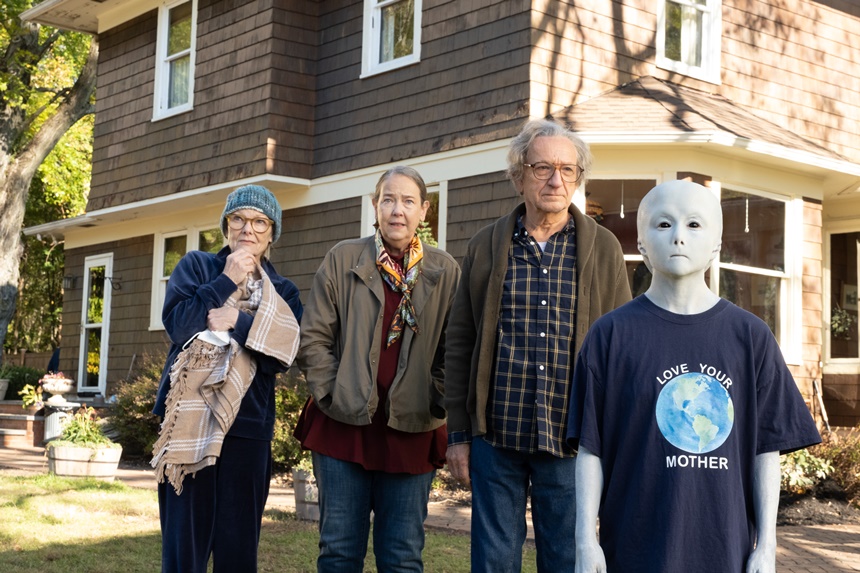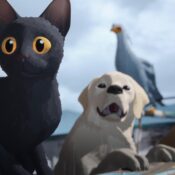Jules
⭐️ ⭐️ ⭐️ ⭐️
Rating: PG-13
Run Time: 1 hour 30 minutes
Stars: Ben Kingsley, Harriet Sansom Harris, Zoë Winters, Jane Curtin
Writer: Gavin Steckler
Director: Marc Turtletaub
At first blush, you might be inclined to dismiss Jules — a comedy about an elderly fellow who finds a stranded space alien in his back yard — as an inconsequential latter-day mashup of E.T. and Cocoon.
But like the speechless spaceman at its center, Jules quietly, almost stealthily, weaves a fabric of thoughtful sentiment and well-earned reflection. Through its fanciful tapestry of cosmically comic misunderstandings runs a thread of somber reality; a meditation on the inevitable shades of loneliness and irrelevance that accompany old age.
You need look no further than the film’s cast to discern Jules is a project that will demand more than passing attention: Ben Kingsley (Gandhi), who for my money has never made a bad film, stars as Milton, an aging widower determined to live out his life in his western Pennsylvania house, despite distinct signs that his mind may be failing him. Zoë Winters, so heartbreakingly brilliant as the billionaire’s last lover on cable’s Succession, plays Milton’s loving but increasingly exasperated daughter. Harriet Sansom Harris, a Broadway staple who shone as Eleanor Roosevelt in 2020’s miniseries Atlantic Crossing, costars as Milton’s friend Sandy, a woman whose eyes never stop smiling but whose soul seems perpetually crushed.
And, perhaps best of all, there’s the ever-wonderful Jane Curtin as Joyce, a steely eyed pragmatist/cat lady who’s fiercely independent and at the same time slightly jealous of the bond between Ben and Sandy.
Into this sharply drawn quartet drops Jules — that’s what Milton calls the mute alien, at any rate — whose standard-issue flying saucer crashes into Milton’s yard late one night. A rambling regular at the local city council meetings, Milton cannot convince anyone that he is currently playing host to an intergalactic visitor.
Truth be told, it seems Milton is enjoying having Jules to himself. Upon realizing the alien is fond of apples, he trundles down to the grocery store and buys several dozen. For days on end, he stands by watching as Jules tinkers wordlessly, repairing his flying machine. For hours on end, Milton unburdens himself of his life story; his unfulfilled hopes, his failures as a father. Evenings end with human and alien sitting side-by-side watching cable news, Milton commenting on current events, Jules staring at the screen, his mouth pursed in a tiny frown.
Before long, both Sandy and Joyce discover Jules. Like Milton, they fall under the quiet spell of the naked blue being, finding him to be the perfect listener. Sandy drops her painfully cheerful disposition long enough to bare her soul about a broken relationship with her daughter. Joyce regales Jules with tales of her improbably wild youth, breaking untold hearts in the big city of Pittsburgh, before launching into a truly bombastic rendition of “Free Bird.”
Through it all, Jules — embodied by longtime movie stunt performer Jade Quon — remains silent; those distractingly dark eyes staring blankly. Jules is either utterly uncomprehending or taking everything in. Hard to tell which.
There is a menacing subplot about federal agents desperately trying to track down Jules’s alien ship, and Milton’s clearly deteriorating health provides some concern. But the heart of Jules lies those scenes of three old people pouring their life stories into the seemingly empty vessel of an alien visitor. They don’t need their old lives; they don’t need to feel essential to an indifferent world. All they need — all anyone needs, really — is for someone to listen. They grow to love Jules, primarily because he is there for them.
Pretending to proffer a tried-and-true science fiction trope, Jules has something more profound than a mere intergalactic adventure in mind, right up to the final moments, when the promise of a warp-speed wrap-up takes a comically tiny, yet significantly meaningful left turn. Director Marc Turtletaub, who produced the similarly subversive Little Miss Sunshine, is a master of this sort or cinematic bait-and-switch. First-time screenwriter Gavin Steckler overcomes some early chronological glitches to shape a masterfully character-driven modern-day fable.
Funny when it wants to be, darksome in all the right places, Jules answers the question, “Is there life out there?” with another question: “Why are you looking out there?”
Become a Saturday Evening Post member and enjoy unlimited access. Subscribe now




Comments
I just saw this movie I loved it and at the same time thought this movie was very sad because they never saw or a spoke to their loved ones
The movie Jules is a deep view into the mind and psyche or we older generation. The tomorrows, however brief their next appearance becomes so tenuous are fleeting moments, prohibiting the past pleasure of recall. It creates a cocoon of loneliness and feeling of being relegated to society’s deserted island of the inconsequential and disallowed as being of any value to the emerging generations. It envelops we aged members of mankind in an eventual abyss of the dark unknown we all eventually must face.